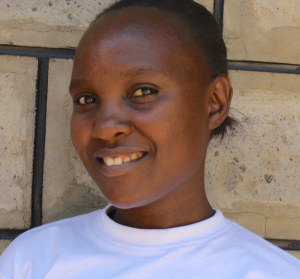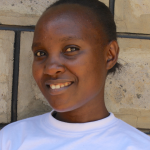There is no water at Ibwali Primary School.
The 373 students attending here are asked to bring a container of water to class each morning. The 3 to 5 liters of water that students carry is not nearly enough to drink and clean latrines and classrooms. Students are sent back out into the surrounding community to find more water.
The water source is a spring which community members tried to protect. They built a brick wall around the eye of the spring and covered the top with cement. We were told that it had a metal discharge pipe that was later vandalized by an unknown person. This led to the brick cover and wall being broken down so people could get the water inside.
Since this spring is in the community (we are excited to share that we are building a spring protection at this spring), students are usually told to wait for the adults to finish fetching water as a sign of respect - and this leads to loss of class time.
The deputy headteacher narrated to us incidences reported by students; there are times students go to fetch water and find terrible, disgusting things floating inside. A lot of class time is wasted when students go to fetch water from the spring. Between carrying water all the way from home each morning and going back out to the spring, students are often too tired to focus during lessons.
"I'm often dehydrated and suffer from headaches because I have to restrict myself from drinking water while in school," said Mr. Khaguli.
Ibwali Primary School was started in 1992 by Mrs. Roda Weku who was recently trained in Early Childhood Development. She attended the local church, so other church members took their young children to the church during weekdays to be taught by Mrs. Weku.
The school grew at a slow pace because the community as a whole did not support education until just recently. The school is built on Mr. Okwako's land now. He is the present chairperson of the school board and he is very keen on development.
What we can do:
Training
Training on good hygiene habits will be held for two days. The facilitator will use PHAST (participatory hygiene and sanitation transformation), ABCD (asset-based community development), CTC (child to child), lectures, group discussions, and handouts to teach health topics and ways to promote good practices within the school. The CTC method will prepare students to lead other students into healthy habits, as well as kickstart a CTC club for the school.
Handwashing Stations
There is nowhere for students to wash hands.
We will deliver two handwashing stations to the school, and the club will fill them with water on a daily basis and make sure there is always a cleaning agent such as soap or ash.
VIP Latrines
"The sanitation of this school is really wanting. Our toilets are usually washed once a day yet most of our students do not know how to use them. By midday, the toilets are usually swarming with flies and a foul stench," said Mr. Khaguli.
"We never want to burden our students with frequent trips to the spring because this would deplete their energy for studying."
Two triple-door latrines will be constructed with local materials that the school will help gather. Three doors will serve the girls while the other three serve the boys. And with a new source of water on school grounds, students and staff should have enough to keep these new latrines clean.
Rainwater Catchment Tank
A 50,000-liter rainwater catchment tank will help alleviate the water crisis at this school. The school will also help gather the needed materials such as sand, rocks, and water for mixing cement. Once finished, this tank can begin catching rainfall that will be used by the school’s students and staff.
We and the school strongly believe that with this assistance, standards will significantly improve. These higher standards will translate to better academic performance!

 Rainwater Catchment
Rainwater Catchment
 Rehabilitation Project
Rehabilitation Project































